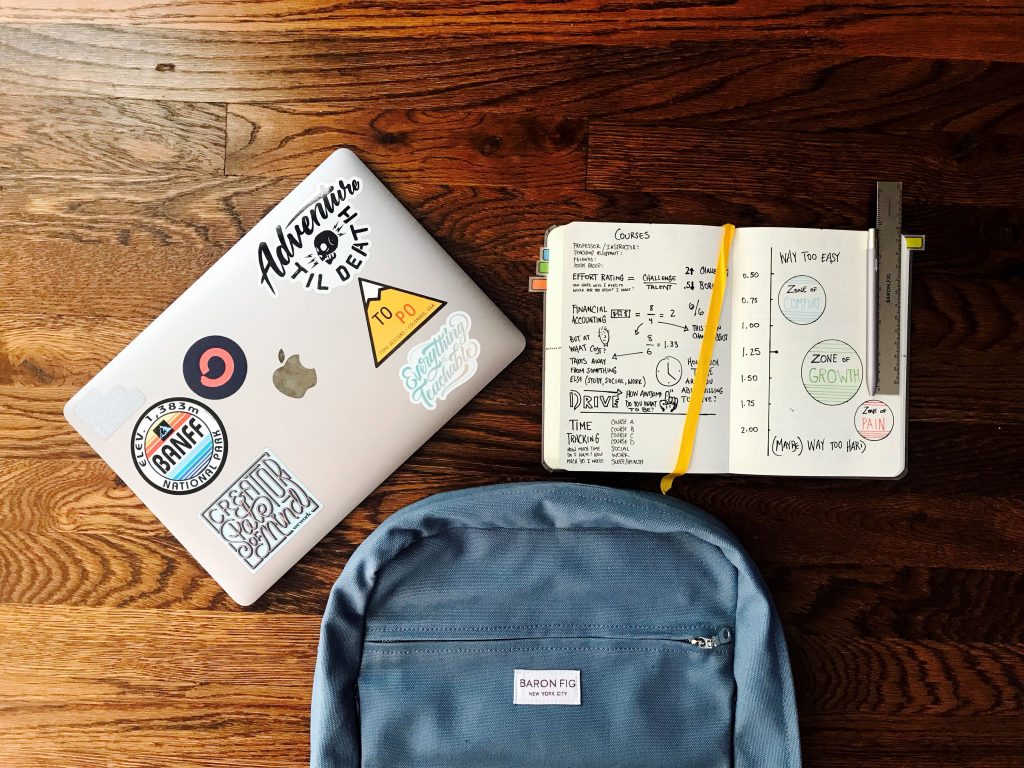
College is an exciting time of new life-changing experiences and great freedom to explore new ideas and find your true self. But it also brings a lot of stress, especially during exams.
Stress is a natural response to pressure, and little stress can be a good thing. It can be useful to keep you focused during exam time, motivate you to get things done, and help you perform your best.
But if you experience too much stress, it can interfere with exam performance and even lead to depression, which is the most common mental health problem for college students. According to statistics, about 40% of college students feel so depressed during the academic year that it is difficult for them to cope with their everyday commitments.
You don’t have to let depression take over you but fight it, so you can focus more on the subject and excel in your exams. Here you’ll find easy tips to help you through the stressful exam period.
Avoid the Perfectionist Trap

Test taking anxiety is usually connected with unrealistic goals. Set realistic goals and don’t expect to be perfect. Just understand how much time you have to prepare for your test and plan what you can manage to do. Anytime you get nervous for test you should accept your situation and work within the realms of what you have. This way, you’ll be able to maximize your productivity without the risk of burnout and exam depression.
All people make mistakes, and that’s OK. Anxiety test for students in 2019 has shown that nearly 70 percent of students go through final exam stress roughly and end up being unsatisfied. If your test results are not as high as you have expected, you’ll feel less disappointed if you know you’ve worked hard and done your best. And these are the things that really matter, not perfection.
Remember that college is not all about studying. Studying should be your highest priority, but you need to balance your life and make enough time for other important things like extracurricular activities, hobbies, and friends. The stress of exam should not provoke depressive moods or health issues. You need to learn how to overcome test anxiety and take care of your well-being all the time.
Practice Self-Care

If you want to study effectively, keep your head together, and not have another test panic, you should definitely take care of yourself. Stress and anxiety tests often show that students who are pulling all-nighters, getting minimal amounts of movement, and surviving on junk food can increase symptoms of stress and make them feel depressed. So you should maintain healthy eating habits, get consistent exercise, get enough sleep every day, and avoid alcohol and drugs.
Exercise
Regular exercise will keep you healthy and can help reduce symptoms of depression and exam stress by releasing endorphins in your brain and boosting your energy level. Research also shows that physical activity can also boost self-esteem, mood, and sleep quality. If getting to the gym feels like too much to start with, you can take regular 30-minute walks or runs three or four times a week. You will see how your exam nerves go away and your general satisfaction grows.
Eat Right
The next exam anxiety killer is your nutrition. It’s vital to maintain a balanced diet during the exam period, so you should stay away from fast food. Instead, your diet should be rich in proteins, vitamins, minerals, and essential fatty acids. Eat fruits, fish, veg, mushrooms, and nuts. Make sure you drink enough water and minimize sugar. Eating healthy food will help you feel more emotionally resilient and less vulnerable to the impact of finals’ stress. And most importantly, you shouldn’t skip meals because it can increase your exhaustion and irritability. So you should eat at least 3 times a day.
Sleep well
Good sleep habits are crucial to your mental health. Of course, you may have an unimaginable amount of studying and assignments to do, but constant fatigue caused by all-nighters can trigger depression. That’s why you should make sure you get 8 or 9 hours of good sleep. That will also help you improve your concentration and memory and increase your productivity.
Take Regular Breaks and Do Things You Enjoy

You are not expected to study for days on end. No matter how intense your exam timetable is, you should schedule study breaks. That can be a short study break of 30 minutes during your revision day or you can plan longer activities and look forward to them. Spend some time away from your textbooks, and it can help take your mind off exams.
Doing things that you are passionate about can help you relax and feel more energetic. It may be going outdoors, playing sports, going out for dinner with friends, watching your favorite YouTube channel, baking, gardening, listening to music – find some time to do what interests you. This way, you may relieve study monotony and change your daily pattern of activities, fear of tests taking will be eliminated, as your brain will be relaxed and full of confidence. That could be critical to ending your depressive cycle.
A good idea is to exercise during your study breaks – you can try any light exercise like dancing, cycling, swimming, or walking that can boost your energy level and relieve tension from depressed studying.
Practice Mindfulness
Set aside a few minutes a day to practice mindfulness techniques. Mindfulness is a type of meditation that allows you to focus on what you are feeling or sensing at the moment without any judgment or interpretation. These practices help with exams anxieties and keep you focused on what is important for you.

Numerous clinical trials have proved that meditation is effective for such conditions as anxiety, stress, and depression, which is extremely relevant to students due to constant dealing with test anxiety. Mindfulness exercises can help you experience different emotions and thoughts with greater balance and acceptance.
As a college student, you have to manage so many commitments at a time, so it’s hard to stay focused and not think about what you need to do next. Mindfulness will help you stay aware and conscious in the present moment and manage your stress level.
You can practice simple mindfulness exercises anywhere and anytime. Here are some examples of simple practices you can incorporate into each day:
- Do just one thing at a time and give it your full attention.
- Put your mobile phone out of reach for some time.
- When you have negative thoughts, close your eyes, and focus on how you breathe.
- Find mindful moments when doing routine everyday tasks like brushing your teeth or washing up.
- Accept who you are and treat yourself the way you treat people you care about.
Practice Positive Thinking

It’s important to believe in yourself. When you have negative thoughts, try to push them away and replace them with positive ones. For example, instead of thinking “I can’t do it and will fail”, you should think “I studied hard, and I am proud of myself.” That can help you stop negative thought patterns, and you’ll feel much better.
While testing anxiety in students we found out that the stress of final exams provokes negative thoughts just before exams and gives no space to perform on a decent level for students. We have asked a bunch of students to try managing test anxiety by thinking and speaking only in a positive context. We started the experiment 2 days before the exam. And this has resulted in no stress of final exams. During those exams students performed really well, gaining high marks with no harm to their mental health. While those who did not take part in the student test anxiety experiment failed exam depressed with even more negative thoughts. This is how the stress of exams and negative thinking can make you fail. So sleep on this idea and do not let it spoil your overall success.
Try Other Relaxation Methods
There are a lot of relaxation techniques you can try to relax your mind, improve your mood, and escape depression:
- Yoga
- Warm bubble bath
- Aromatherapy
- Massage
- Visualization
- Music and art therapy
- Tai chi
- Progressive muscle relaxation
- Deep breathing
- Autogenic relaxation
It’s up to you to choose what suits you most. But you’ll benefit more if you use them together with other positive coping methods to eliminate fear of taking tests that we’ve already discussed in this article. Besides, you should remember that any relaxation technique is a skill, and if you practice it a lot, you’ll learn to relax consciously when you start experiencing stress and test anxiety symptoms.
Have a Support System
Final week stress can bring symptoms of depression at any point in someone’s life. It’s OK to ask for help and accept it from those who care if you are struggling during bad days. Talk about your feelings with supportive family members and friends or seek out student support groups.

Let your friends and family know how they can support you. Telling someone about the pressure you feel will bring you some relief, and you’ll be amazed to learn that you are not alone with your depression and study. You can also speak to a mental health professional, and they will provide you with advice on how to build coping skills and manage depression and studying anxiety.
Quick Tips to Manage Pressure During Exams
Here are our most complete test anxiety tips for students which will help anyone who is stressed about exams.
Allow yourself time to rest when you feel tired.
- Plan your days carefully and prioritize your tasks. Develop a study plan. That will help you focus on things that matter and what needs to be done.
- Reward yourself when you reach a specific study goal or complete something. Read a chapter from your favorite book, go for a short walk, or watch a movie. Do anything you like because you deserve it.
- When you feel overwhelmed and frustrated, just take a deep breath and say to yourself, “I can do it.”
- Avoid other stressed people because they can make you even more anxious.
- Don’t feel guilty about the grade you’ve got for your exam. You’ve done your best, and you can’t change anything. So just focus on your next exam. Relax before a test.
Although exams and coursework are stressful, they won’t last forever. Look at them as an opportunity to test your skills and boost your self-growth. Anxiety test taking may pursue you for a long time but you can develop a positive attitude and remember that you are not the only student who has to pass exams. Use our strategies for test anxiety elimination to achieve study-life balance and try relaxation techniques to improve your mood.
Remember that anyone can become depressive at any point in their life. But depression is a treatable condition, and you don’t have to cope with it alone, so have the courage to ask for help when you need it.



